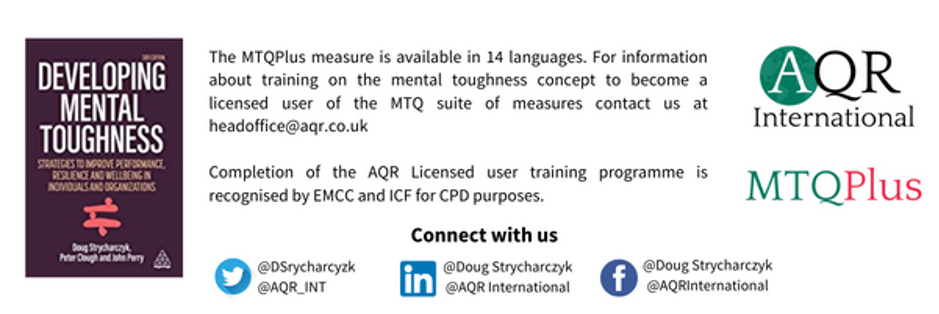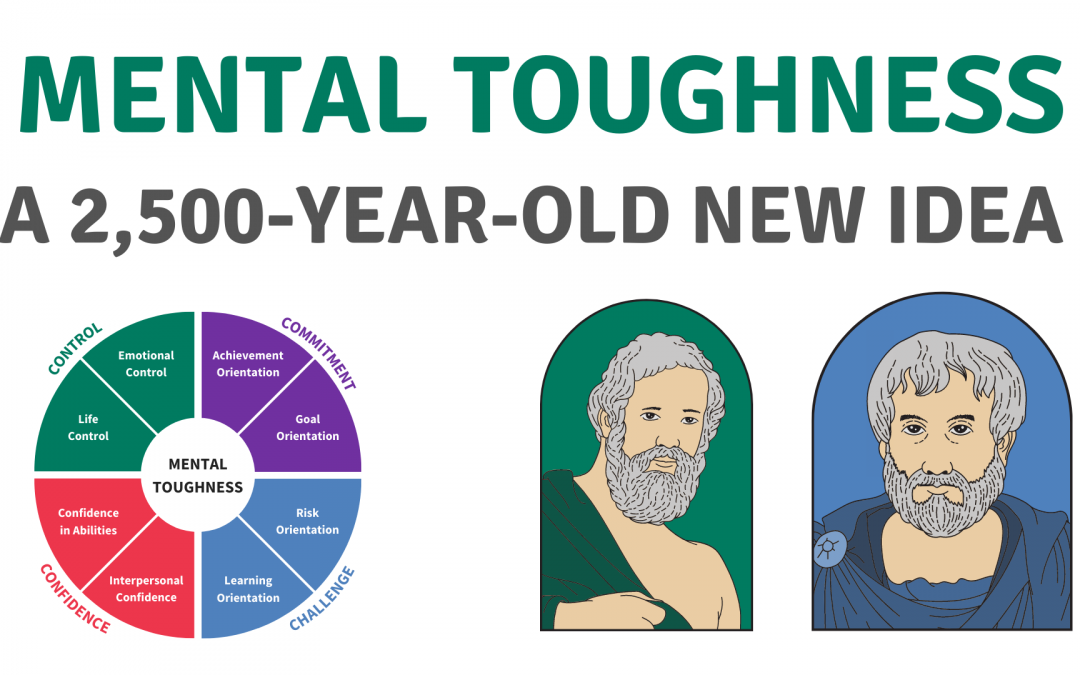As the Mental Toughness concept begins to enter the mainstream of people and organisation development, there is a temptation to see this as a new concept.
In fact, like leadership, it is a concept that has long been understood to be important and valuable for success in life. We just didn’t know what it was exactly … until now.
With the development of the 8-factor version of the 4Cs mental toughness concept we now have a framework through which we can understand the complexity and impact of our mental responses to events. With the development of the MTQPlus measure, we are able to assess to what extent we are mentally tough or mentally sensitive across those eight factors.
2,500+ years old? The Greeks.
The first recorded mention of an equivalent concept came from the Greek philosopher, Plato (427- 347 BC). He, and others, called it fortitude. Note that this was the first written record. The Greeks until that time had passed on knowledge and wisdom within an oral tradition. It is likely that this was discussed and understood even before Plato.
The ancient Greek philosophers and thinkers identified four cardinal virtues of mind and character which they regarded as the basic virtues required for a virtuous life.
These are:
- Prudence – the ability to do the right thing at the right time and to bear in mind any consequences of so doing.
- Justice – it stands for fairness, righteousness, and a lack of bias. How appropriate given today’s interest in equality and diversity!
- Temperance – describing restraint, the practice of self-control, abstention, discretion, moderation and the avoidance of addiction.
And
- Fortitude (ἀνδρεία) – meaning courage: forbearance, strength, endurance, and the ability to confront fear, uncertainty, and intimidation.
In writing about Fortitude, Plato also refers to a virtue that enables us to face the difficulties that get in the way of living a contented and productive life.
He recognised that many could fear many things in life and that this was a natural response to perceived threats.
A courageous person manages this fear. Fortitude has been described as the mindset that embraces the application of certain qualities to achieve one’s purpose in spite of obstacles or setbacks.
These include.
- Valour: managing the threat, seizing the opportunity
- Determination: commitment to achieve what it is important to achieve
- Reliability: speaking the truth but presenting oneself in a genuine way
- Vigour: approaching life with confidence, self-belief, enthusiasm, and energy
How similar is this to our understanding of mental toughness today?
| MT Scale | What does each factor represent … what does the MTQPlus assess?
|
| CONTROL | Life Control – Self-worth – I believe I control enough of my life to achieve what I need |
| Emotional Control – I can manage emotions and not allow them to influence what I do | |
| COMMITMENT | Goal Orientation – I have a sense of purpose and like to set goals for this |
| Achievement Orientation – I am minded to do what it takes to achieve my goals | |
| CHALLENGE | Risk Orientation – I welcome experiences – I see opportunity more than I see threats |
| Learning Orientation – I reflect and learn from all that happens – including setbacks | |
| CONFIDENCE | In Abilities – I believe in my abilities to deal with life – and will use my abilities |
| Interpersonal Confidence – I can comfortably engage with and influence others |
Aristotle, a pupil of Plato’s, also subscribed to the 4 virtues describing Fortitude as “moderation or observance of the mean with respect to feelings of fear and confidence.”
Incidentally, the 4 virtues have been adopted by both Christian and Islamic faiths as core concepts. With the addition of Faith, Hope and Charity, these are the 7 Christian virtues.
Interestingly Plato also points to a distinction between Happiness (subjective wellbeing and transient) and Contentment (psychological wellbeing and enduring). Stating that “The greatest wealth is to live content with little”.
In other words, to lead a satisfying life you appreciate what you have and what you have earned and there is no need to seek that in the acquisition of material wealth.
The Stoics
Although stoicism is associated with the Romans and people like Zeno, Seneca, Epictetus, Marcus Aurelius and Cicero and their quotes are widely used to illustrate stoicism, in fact, it’s fair to say that the Greeks were the original stoics.
The “Roman” stoics subscribed to the same belief (and from the same source, Plato) that for human beings the contented life was to be found only in the pursuit of virtues – particularly the 4 Cardinal virtues.
Stoicism is a philosophy of personal ethics and a methodology for seeking practical wisdom in life. A key principle of the ancient Stoics was the belief that we don’t react to events; we react to our judgments about them – in today’s language “our mental responses”, and that those judgments are for us to manage.
Epictetus, often quoted, was born a slave, therefore with very little control. He attributed his capacity to avoid destructive emotions to recognising he had the power to determine how he appraised situations.
We should not worry about things beyond our control as everything in life can be divided into two categories – things that are up to us and things that are not.
Again this might appear as a very modern idea when we speak about Covey’s Circle of Concern, locus of control and self-efficacy.
The point
People have been around for a long time so it’s not really a surprise that people have often wondered about things like happiness and contentment, surviving and thriving, struggling and succeeding and so on and made some good connections between certain behaviours and approaches that tend to predict good rather than poor outcomes.
The 4Cs mental toughness concept has brought something that we have always known to be important up to date in the sense that :
- In the eight factors, we now understand what fortitude means in some detail (and indeed some aspects of the other virtues) and that detail is useful in understanding in a very practical way some of the complexity behind the concept.
- In the MTQPlus we have a very high-quality psychometric which gives the user the capability to make much better assessments about the mental toughness profile of individuals and groups.
Small wonder that some are describing our work as neo-stoicism.
I think Plato might have been contented to hear this.



